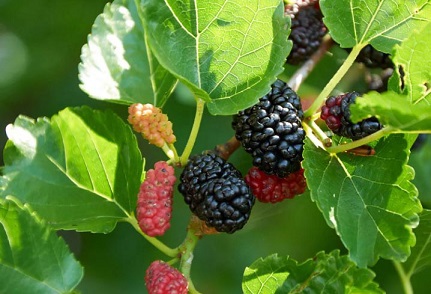Thailand medical researchers discover that Mulberry leaf extract shows potential in the fight against COVID-19
Nikhil Prasad Fact checked by:Thailand Medical News Team Aug 13, 2024 8 months, 1 week, 5 days, 13 hours, 32 minutes ago
Thailand Medical: Exploring the Power of Nature in Combating SARS-CoV-2
A groundbreaking study conducted by researchers from several prominent Thai institutions has unveiled the potential of Thai medicinal plants in the fight against SARS-CoV-2, the virus responsible for COVID-19. This research, which brings together the expertise of scientists from the Suranaree University of Technology-Thailand, the School of Biology, and the Faculty of Veterinary Science at Mahidol University-Thailand, explores the antiviral properties of these plants. This
Thailand Medical News report delves into the study.
 Thailand medical researchers discover that Mulberry leaf extract shows potential
Thailand medical researchers discover that Mulberry leaf extract shows potential
in the fight against COVID-19
The COVID-19 pandemic has highlighted the urgent need for effective treatments to combat the virus. While vaccines have provided some protection, their efficacy can be limited, especially against emerging variants. This has led researchers to explore alternative therapies, including those derived from medicinal plants, which have been used for centuries in traditional medicine.
Screening Thai Medicinal Plants for Antiviral Activity
In this study, 19 different Thai medicinal plants, known for their traditional use in treating fever and flu, were selected for screening. The researchers prepared ethanolic-aqueous crude extracts (CEs) from 22 different plant parts and tested their antiviral activity against the porcine epidemic diarrhea virus (PEDV), a surrogate virus used to predict anti-SARS-CoV-2 activity.
The screening process revealed that eight of the 22 extracts demonstrated significant antiviral activity, achieving a reduction in viral plaque formation by 70% or more. These promising extracts were then further tested for their activity against SARS-CoV-2 using Vero E6 cells, a cell line commonly used in virology research.
Among the tested extracts, the water fraction of the mulberry leaf crude extract (WF-MLCE) stood out as the most potent. This extract showed remarkable efficacy, reducing the viral load by 99.92% in the pre-entry mode (before the virus entered the host cells) and by 99.88% in the post-infection mode (after the virus had already infected the cells). These findings suggest that WF-MLCE could be a strong candidate for developing new antiviral therapies.
Unlocking the Secrets of Mulberry Leaf Extract
To better understand the antiviral properties of WF-MLCE, the researchers conducted a detailed chemical analysis using liquid chromatography–high-resolution mass spectrometry (LC-HRMS). This technique allowed them to identify the specific compounds in the extract that might be responsible for its potent antiviral activity.
The analysis revealed that flavonoids, a group of natural compounds known for their antioxidant and anti-inflammatory properties, were the predominant compounds in the extract. In particular, three flavonoids - myricetin-3-O-β-D-galactopyranoside, maragrol B, and quercetin 3-O-robinobioside….exhibited strong binding affinities to the main protease (Mpr
o) of SARS-CoV-2, a critical enzyme involved in the virus's replication.
Molecular docking studies, which simulate how these compounds interact with the virus at the molecular level, confirmed their potential as antiviral agents. These flavonoids were able to bind to the active site of Mpro with high affinity, suggesting that they could effectively inhibit the virus's ability to replicate.
The Potential Impact of WF-MLCE on COVID-19 Treatment
Given its low cytotoxicity (meaning it is not harmful to human cells) and high antiviral potency, WF-MLCE holds great promise as a candidate for future therapeutic development. The fact that this extract comes from a plant that is widely available in Thailand also makes it an economically viable option for large-scale production.
Moreover, the study highlights the potential of traditional medicinal plants as a source of new treatments for emerging diseases like COVID-19. By combining traditional knowledge with modern scientific techniques, researchers can discover new compounds that may offer effective alternatives to existing drugs, which often come with significant side effects.
Conclusion: A Promising Path Forward
The discovery of the antiviral properties of WF-MLCE is a significant step forward in the search for new treatments for COVID-19. While more research is needed to confirm these findings in clinical settings, this study provides a strong foundation for future investigations.
The research also underscores the importance of preserving traditional knowledge and biodiversity. As the world faces new health challenges, the wisdom of ancient remedies could play a crucial role in developing the next generation of antiviral therapies.
The study findings were published in the peer-reviewed journal: BMC Complementary Medicine and Therapies.
https://link.springer.com/article/10.1186/s12906-024-04586-z
For the latest on COVID-19, keep on logging to
Thailand Medical News.
Read Also:
https://www.thailandmedical.news/news/thailand-medical-authorities-issue-urgent-warning-on-melioidosis-amid-rising-cases
https://www.thailandmedical.news/news/thailand-medical-researchers-discover-black-rice-anthocyanins-may-fight-alzheimer-s-disease#google_vignette
